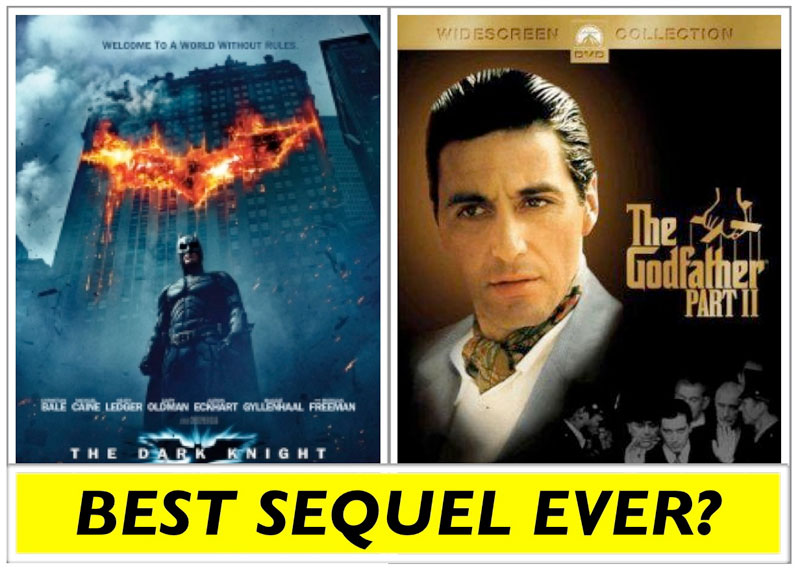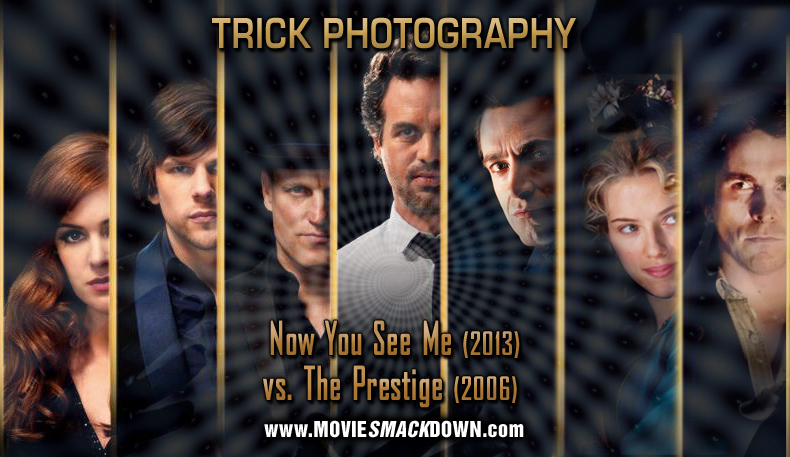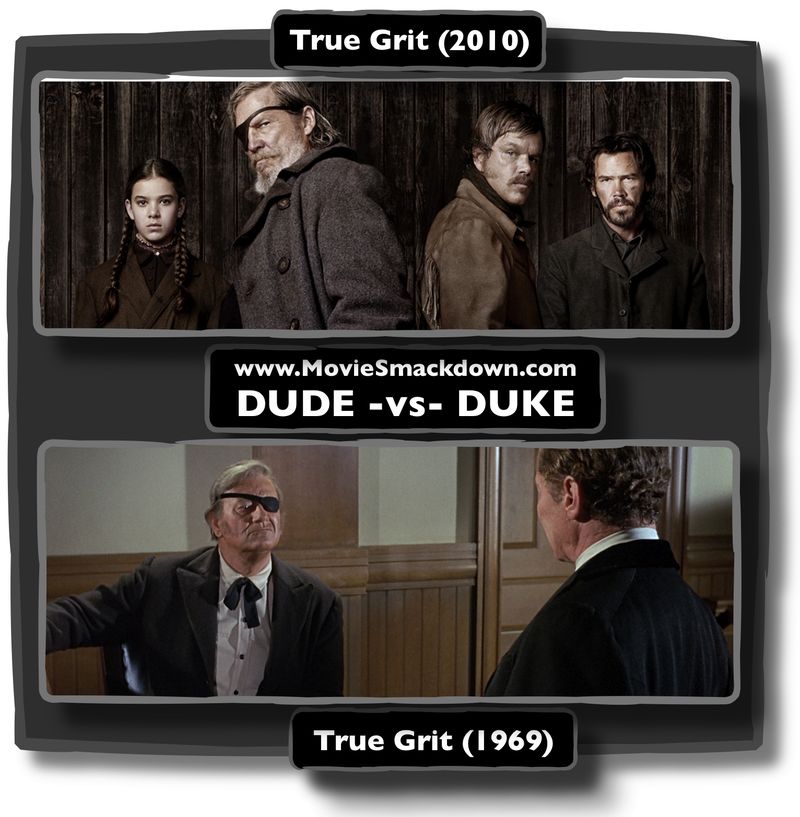
 The Smackdown
The Smackdown
When “The Dark Knight” hit movie screens earlier this year, critics screamed that cinema history had just been made, that it was even better than the movie that spawned it and, just possibly, one of the best films ever released. Â In 1974, the same thing happened.
“The Godfather, Part II” was not only seen as the best sequel ever but it stood up as a great film, winning the Oscar for Best Picture, like its predecessor from two years earlier. The test for these sequels is whether they managed to continue and expand upon the originals that came before them, by charting fresh new territory, raising the stakes and deepening the concepts.  Now is the perfect time for this true Smackdown of Champions since “The Dark Knight” has just been released on DVD and Blu-ray and “The Godfather, Part II” was recently released as part of the meticulously done Coppola restoration, also in both formats.
Just like any film, sequels must justify their very existence to even be made. However, sequels also pull double duty, having to prove not just “why make it?” but also “why make more?” The answer, usually, is because new films make more money and, hopefully, establish a franchise for the studios that make them. Sometimes, and these two films are prime examples, something else happens and the answer to “why make more?” is simply that there is more story to tell with characters that filmmakers and audiences just aren’t done with.
Which one of our two films is the Best Sequel Ever Made?  Is it the one starring Batman, the crime-fighter in The Dark Knight, or is it the one with Michael Corleone, the crime-lord in The Godfather, Part II?  Our battle is likely to be disastrous, brutal and raw — like the films themselves.  Let’s introduce the challenger…
[singlepic id=208 w=320 h=240 float=right]
The Challenger
The Dark Knight is Christopher Nolan’s ambitious sequel to Batman Begins, which reinvigorated the destroyed Batman franchise of the 1990s. Penned by his brother Jonathan Nolan, Christopher Nolan’s film explores the social impacts of Batman’s rise in Gotham City. As Batman arrives on the scene, the mobs–reeling from the crimelord Carmine Falcone’s fall in Batman Begins–attempt to uphold their empires in a city that is increasingly becoming Batman’s war zone. Initially, the mobs seem to be just barely getting by. However, when District Attorney Harvey Dent launches a huge prosecution circus with the help of Lieutenant Jim Gordon, the mobs find themselves on the ropes and in desperation turn to the Joker for help. But little do these mobs know the person they’ve unleashed. Soon the mob’s interests are left behind as The Joker turns Gotham upside down with his anarchist terrorist attacks, all geared at challenging and upturning Batman’s crusade. As the film escalates and the casualties mount, Nolan allows Batman’s seemingly water-tight ideals — so firmly established in Batman Begins — to leak. Slowly and dreadfully, the line between Batman’s views of justice and Joker’s adoption of amorality start to blur. In the end, audiences are left unsettled as they watch one hero fall, another one destroyed, and yet another isolated and overwhelmed.
The film has been accused of being overlong. However, on close examination, one would be hard press to find superfluous scenes in this film. Already embracing a 4-act structure, the film could actually be accused of needing more scenes to explain some characters inexplicable character movements and some odd transitions in time.
[singlepic id=32 w=320 h=240 float=right]
The Defending Champion
Michael Corleone’s descent into the dark underworld of crime is a tale of cinema history. A twisted, cynical take on the myth of American opportunity, The Godfather Part II finds Michael as head of the Italian mafias following his vicious decapitation of the five families in The Godfather. Now, Michael battles new foes as disgruntled Mafia dejects seek revenge, a maniacal Jewish crimelord strives to change the world map, and his own family falls apart under the strain of the family business. If The Godfather forced Michael to sacrifice his soul and embrace his father’s legacy in order to protect the family, The Godfather Part II sees Michael sacrifice the family for the family. Michael truly finds himself becoming something worse than even his father’s evils, a man absorbed in vengeance and not just protection. Echoing the words of the young naive Michael in The Godfather, Don Michael Corleone has completely made it “personal” in this sequel, ruthlessly dispatching traitors, dissidents, and any obstacle that doesn’t seem to respect him like they did his father.
What’s unique about this second Godfather installment is that it juxtaposes Michael Corleone’s attempts at power consolidation with his own father’s, Vito Corleone, rise to power in early 20th century New York.  This creates a surreal feeling to the film, the juxtaposition sometimes playing as ironic and sometimes playing complementary to the dramatic conflict of both eras. It truly creates a feeling of a familial dynasty, a sort of empire that is crumbling under the ruthless, paranoid intellect of Michael Corleone. However, the parallel storyline also greatly increases the film’s runtimes and audiences may be left floundering a little too much in Francis Ford Coppola’s long, moody takes.
The Scorecard
The Godfather Part II is easily a fitting sequel to The Godfather. Picking up in Nevada, the film further chronicles Michael Corleone’s decision to expand his father’s criminal empire. High on stakes, Michael’s ambitions become international as he attempts to influence events in Cuba. As both his brother and friends betray him, Michael is brought before a rather “out-of-the-blue” Congressional committee aiming to destroy the Corleone family at the secret behest of Jewish crimelord Hyman Roth. It’s a fantastic feeling, watching Corleone’s world simply fall apart around him and watch Corleone confront each conflict with a ruthless, if predictable, skill.
However, the harrowing escalation of Corleone’s world is somewhat hampered by the introduction of Vito Corleone’s rise to power. At times, Coppola gets great mileage out of this choice, typically very early on as we see Vito as a lost child. However, as Vito begins to consolidate his own power, Coppola’s past explorations seem more a reverential look at a one of cinema’s favorite personalities rather than a dramatic exploration of the conflicts said character faced. The outcomes to each of Vito’s challenges are predictable, and one can see the climax of Vito’s journey coming from the very start of the movie.
Now, The Godfather does take the themes of good and evil in The Godfather Part II and begins exploring them more fully, if introspectively. The Godfather Part II feels most comfortable when exploring questions of family and loyalty.  And while it may seem at first that Coppola is providing multiple answers to these questions, it becomes clear by the end that Coppola is simply giving us the same answer, sometimes straight-up and other times delayed. That answer: “Regardless of if you’re a family member, a business partner, or a powerful senator, no one — absolutely no one — is more important than the integrity of the family business.” However, the irony of this theme is that Corleone’s approach to protecting the family’s integrity seems hypersensitive and personal. This provides a wonderful tension and hypocrisy, and leads to some great scenes involving Corleone and his brother in Cuba and later with Corleone and his wife.
The Dark Knight, like The Godfather Part II, cracks open the themes of its predecessor. However, whereas The Godfather Part II asks introspective questions about family, The Dark Knight asks extroverted questions about the role and extremes of justice in a corrupt society. It teases with the consequences of terrorism, and the morality of taking matters into your own hands. For a superhero movie, it truly breaks the formula and questions the justice behind many superheroes’ crusades. The Joker is a fascinating character in that Jonathan Nolan writes and Christopher Nolan directs the villain as an unstoppable force of nature, something that neither Batman nor his allies can truly comprehend and, because of that, also stop.  The film functions more as an ensemble because of this, watching Christian Bale, Gary Oldman, and Aaron Eckhardt deal with the Joker’s attacks.
Unlike pan>The Godfather Part II, The Dark Knight takes the character progression in Batman Begins and reverses it, taking Batman to a point where he no longer wishes to be Batman and then, furthering this, taking it to a place where Batman realizes he has trapped himself as the avenger of Gotham City. The Godfather Part II does not attempt to reverse Michael Corleone’s character progression; he simply continues to get more sinister and corrupt. There is never a moment where Corleone honestly seems ready to reform. Even as he argues with his wife, Corleone appears to be lying. Bruce Wayne, in The Dark Knight, is truly doubting himself and because of this, the stakes seem so much higher and unpredictable.
Between the two, there is much more a sense of consequence in The Dark Knight, perhaps helped by the non-inclusion of a narrative we already know the ending to (i.e. Vito Corleone’s rise to power). As a sequel, The Dark Knight truly puts the hero in a different place than he was in Batman Begins. Bruce is literally questioning his mission, and becoming a public outcast because of his mission. Michael Corleone is essentially in the same situation as he was in The Godfather Part II, just in different locations with different people. In fact, Michael Corleone uses much the same tactics to take out his enemies, albeit the tactics are used on people we don’t expect (i.e. Fredo’s death). But, in terms of breaking into new territory, The Dark Knight seems to unleash itself and devastate the seeming sense of security and justice established in its predecessor. The Godfather Part II retreads the same ground, showing us the same Michael Corleone doing the same things just to different people.
The Decision
In terms of sequels, both of these films are amazing.  “The Dark Knight” will no doubt become an American movie classic. Both of these films took their genres (crime and superhero) and truly made them epic in scope and feel. However, “The Godfather Part II” has a feeling of “been there, done that” as we find Michale Corleone doing what he does best: ruthlessly protect his family. His character arc continues to a natural and predictable end where he is left alone and isolated. Subtly, this seems like a sense of failure for Corleone. However, let not “The Dark Knight”‘s action sequences and superheroics detract from is artistic integrity. The film completely rehauls Batman’s character and challenges the very notions it brought up in its predecessor. It is not more of the same and that is why it feels so different and dangerous. The consequences are higher and the unpredictability of a villain like Joker makes Bruce Wayne’s character arch something different, and something more dire.  “The Godfather Part II” is a masterpiece film and perhaps it is good that we are not just comparing these films on basis of film quality alone. But when it comes to a sequel that justifies the necessity of its creation, “The Dark Knight”‘s refreshing take on its own material and the territory it explores proves quite the hit to “The Godfather Part II,” which seems safely comfortable in giving audiences the same movie as before with just a few changes. “The Dark Knight” reigns.




This is two of the greatest movie ever made but I think I would prefer The Dark Knight because it has that deep meaning of the story which makes it more epic and great. And I don’t think The Godfather 2 would match the scripting of The Dark Knight because everything of a character in there talked about was full of sense. Especially when The Joker talks, you will force yourself to listen of whatever he says especially the interrogation scene when he express his true intention and belief about people and life that later batman proved wrong. And that sequence of the story sends us a message that can really relate to our lives and I think it is the beauty of that movie, a superhero movie that we can relate on deeper and better than any superhero movies. I respect the The Godfather movies it’s just that I see it as an ordinary gangster film or like a true story of a gangster family.
The Dark Knight Is Better Than The Godfather: Part II.
This article was a joke, right? Comparing the laughably overrated The Dark Knight to the frighteningly epic drama The Godfather II. The Godfather II had a feeling of “been there done that”? Seriously? Did you not see the rise and fall of the Corleone family in one movie? Did you not appreciate the parallel stories of Vito rising to the top and the irony of his son also doing the same thing but with a pyrrhic victory? What did you get in The Dark Knight? Oh, here’s Bruce Wayne, the same dull grunting character fighting more bad guys with a hilariously unrealistic plot and running away in the end. Please.
No joke… that’s how we review them. Both of these films are #2 in a three part trilogy. Which one did it best? People can and will disagree. Did you vote your feelings in the poll? http://www.facebook.com/moviesmackdown
Come on people, please…..The Dark Knight (2008) is soooo overrated its not even funny! The Godfather Part II (1974) is not only the greatest sequel ever made, but is almost as good or even better than The Godfather (1972). I actually believe the Godfather Part II is better than The Godfather, as its beautifully acted, shot, and directed. The Godfather Part II probably also had the best musical score EVER and the Art Direction was magically beautiful as you really felt you were in 1917 New York City and 1958/1959 Lake Tahoe, Nevada/Miami, Florida/Cuba. With the Dark Knight, you’re supposed to actually feel like your in Gotham City whereas I felt like I was watching Batman and his friends in Chicago, Illinois. Another argument that could be made is that Batman Begins is no where near as “good” as the Dark Knight, which hurts its case.
So the verdict is in, The Godfather Part II (1974) wins hands down over the overrated Dark Knight (2008). Along with The Godfather (1972), it will always be considered the Greatest Masterpiece Saga in the History of Motion Pictures. Case Closed…..
P.S: And by the way, I’m 24 years old, born in ’88, so please don’t call me an old fart who hates new movies…..
your comment is irrelevant for three reasons:
1 – The best film score ever is Star Wars.
2 – The “greatest masterpiece saga” is Lord Of The Rings.
3 – The Dark Knight is better.
As a life-long “Godfather” maniac, I didn’t think I could be swayed by anybody’s arguments. But you did, sort of. Because it’s true that “The Dark Knight” goes off in a whole new direction and expands the mythology while “The Godfather, Part II” is an extremely satisfying continuation of an epic story. How am I supposed to vote in your poll now!?
This may be the toughest Smackdown in our history. You’ve analyzed it well and if I wasn’t so emotionally attached to “The Godfather, Part II” I would vote for “The Dark Knight.”
Your points are valid. TDK is better than its predecessor. And it does go radically into new territory and change the characters.
Very tough…